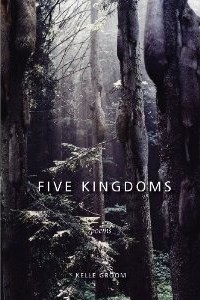Issue 4 - Winter 2011 Reviews Arranging the Blaze Beasts and Violins Crazy Jane Eating Fruit Out of Season Five Kingdoms Hard Rain Heathen Little Oceans Multiverse Open Slowly Psyche's Weathers Silent Music Something Must Happen The Apocalypse Tapestries The Darkened Temple The Kingdom of Possibilities The Tyranny of Milk This Pagan Heaven Woman on a Shaky Bridge You Know Who You Are Interviews
 |
Five Kingdoms by Kelle Groom, “based on the five kingdoms of life which categorize every living thing” (105) is a stunning collection of poems that will submerge you into our primordial sense of connection to all the things around us. Groom has connected our modern existence with our emergence from nature in a way that will fall on you like cooling water. Tony Hoagland has said that Groom’s poems: “are like underwater songs, sung from the submerged continent of the inner life, the life we don’t often expose to the outer world, the one we don’t speak of.” Groom speaks of this inner life and speaks of it well. From the opening poem, “Bone Built for Eternity” based on a painting by Guillermo Kuitca about a 3.3 million year old child’s skeleton found in Ethiopia—the earliest child in human fossil record, Groom’s voice calls to us from our beginnings:
So begins Groom’s journey looking to the past to make sense of the present. Her attention to the detail of the skeleton of the child comes to us in pieces, as if emerging from a womb. The shift in language from awe with “we will come looking for you” reminds us that even after 3 million years, we are all connected to a past we never fully understand. In the title poem of the collection, “Five Kingdoms” Groom asks us to consider the repercussions of modern living:
These modern things that are a part of our everyday life seem to be leading to our own destruction. It seems a stark and chilling reminder of the downward spiral from finding the existence of a 3 million year old child to dropping an atomic bomb causing the destruction of so many. Groom also fragments time to bridge the gap between this amazing place that seems to suspend time. In “Oldest Map of the World” She describes this place as if our past, our present and our future are all here, now, existing on the same plane:
But Groom doesn’t only deal in the juxtaposition of us with nature. In “1984” we hear a slightly ironic voice with this interaction with Allen Ginsberg:
--
We have a young girl meditating on these words scribbled by Allen Ginsberg, leaving their traces, brushing against her clothes until the somewhat humorous ending of realizing not only are there no napkin holders, but there are also no napkins as the change of time alters even Groom’s urban landscapes. Five Kingdoms is a sensory exploration through our connections to nature, each other and everything around us. The collection is broken into three sections: 1. The five Kingdoms Each section fully explores the challenges connections and interrelationships within each of us. The voices are strong and unflinchingly open to view the world around them. Groom’s poems engulf the reader like this “submerged continent of inner life” and she not only begs us to follow her on this journey put lays down the footpath so we can follow this map that “fits in the palm of a hand.”
Reviewed by Joan Hanna. |
